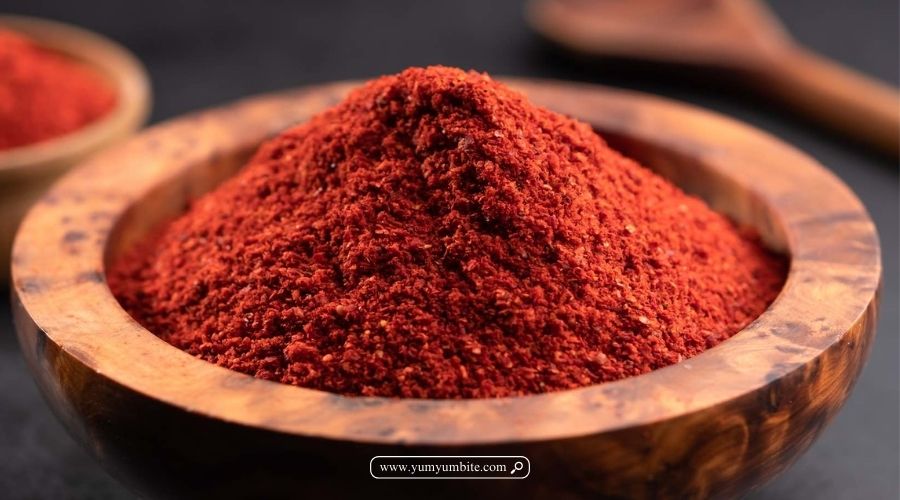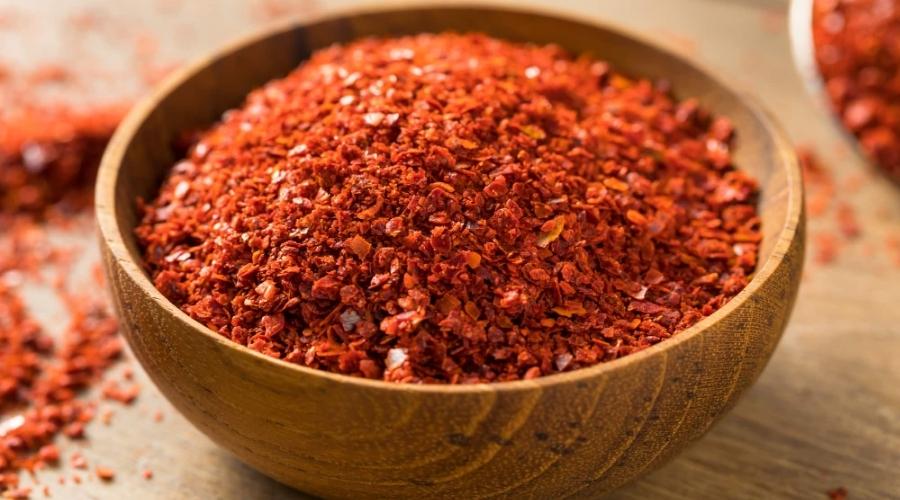Aleppo powder, known for its unique fruity heat and complex flavor, is a staple in many Middle Eastern and Mediterranean dishes. However, this distinct spice may not always be readily available in every kitchen.
Whether you’re facing a shortage of Aleppo pepper or looking for a new twist on your recipes, finding suitable substitutes can help maintain the balance of flavors in your dishes.
In this blog, we explore 12+ effective alternatives to Aleppo powder, each bringing its own set of flavors and heat levels.
From common pantry spices to specialized blends, these substitutes offer a range of options to enhance your culinary creations.
12+ Flavorful Substitutes for Aleppo Powder You Can Use Today
Finding the right substitute for Aleppo powder can open up a world of new flavors and possibilities in your cooking.
Each of the 12+ alternatives discussed provides a unique twist, whether you’re aiming for a smoky depth, an extra kick of heat, or a touch of sweetness.
By understanding the characteristics of these substitutes and how they compare to Aleppo powder, you can make informed choices that will keep your dishes delicious and well-balanced.
Paprika
Paprika can be used as a substitute for Aleppo powder, particularly in recipes that require a mild, sweet, and slightly smoky flavor. It is a versatile spice that works well in dishes like stews, soups, and roasted vegetables.
While paprika does not replicate the unique fruity heat of Aleppo pepper, it provides a similar color and a touch of sweetness that can enhance the overall flavor profile.
Be cautious with the amount used, as paprika’s flavor can be milder and less complex compared to Aleppo powder. Adjust the quantity to match the heat and flavor intensity of your recipe.
Cayenne Pepper

Cayenne pepper is a suitable alternative to Aleppo powder when you need a spicy kick.
It has a more intense heat level compared to Aleppo pepper, making it ideal for recipes that can handle a higher level of spiciness.
Use cayenne pepper in dishes like chili, curries, and hot sauces.
Since cayenne pepper lacks the fruity undertones of Aleppo powder, consider mixing it with a bit of sweet paprika or a pinch of sugar to achieve a more balanced flavor.
Be cautious not to overuse cayenne pepper, as its heat can quickly overpower other ingredients.
Crushed Red Pepper Flakes
Crushed red pepper flakes can replace Aleppo powder, especially in recipes where you want a similar heat but with a bit more texture.
These flakes work well in dishes like pasta sauces, pizza, and stir-fries.
Crushed red pepper flakes offer a spicy kick and a crunchy texture but may not have the same depth of flavor as Aleppo pepper.
To achieve a closer match to Aleppo’s flavor, consider adding a small amount of paprika or a touch of sugar to balance the heat and enhance the overall taste of your dish.
Harissa Powder
Harissa powder, a North African spice blend, can be an effective substitute for Aleppo powder in recipes that benefit from a bold, complex flavor.
Harissa powder typically includes a mix of spices like coriander, cumin, and garlic, along with dried chili peppers, providing a rich, smoky, and slightly spicy flavor profile.
It works well in dishes such as stews, marinades, and roasted meats.
Since harissa powder has a more complex flavor than Aleppo pepper, it’s best used in recipes where its unique blend of spices complements the other ingredients.
Adjust the amount to taste, as harissa can vary in heat and spice intensity.
Sriracha Powder
Sriracha powder is a good substitute for Aleppo powder, especially if you’re looking for a combination of heat and a touch of sweetness. It provides a spicier kick with a hint of garlic and vinegar, making it suitable for recipes like stir-fries, dips, and seasoning blends.
However, Sriracha powder’s distinct flavor profile differs from Aleppo pepper’s more fruity and mild heat, so it might alter the taste of your dish. Use it sparingly and adjust according to your taste preferences to achieve a balance of heat and flavor.
Ancho Chili Powder
Ancho chili powder can serve as an alternative to Aleppo powder when a mild, smoky flavor is desired.
Made from dried poblano peppers, ancho chili powder offers a rich, slightly sweet, and smoky taste that can enhance recipes like chili, tacos, and sauces.
While it does not have the same heat level as Aleppo pepper, it adds depth and complexity to your dishes.
If you need more heat, consider combining ancho chili powder with a pinch of cayenne pepper or red pepper flakes to achieve a closer match to Aleppo’s spiciness.
Gochugaru

Gochugaru, a Korean red pepper powder, can be used as a substitute for Aleppo powder, especially in recipes that benefit from a bit of heat and sweetness.
It has a fruity flavor and a moderate level of heat, making it suitable for dishes like Korean stews, kimchi, and spicy sauces.
Gochugaru’s texture and flavor are somewhat similar to Aleppo pepper, though it may be slightly more pungent.
Adjust the quantity based on your taste preference and the heat level you want to achieve, and remember that gochugaru may contribute a slightly different flavor profile to your dish.
Chipotle Powder
Chipotle powder, made from smoked and dried jalapeño peppers, can be a good alternative to Aleppo powder, especially when you want to add a smoky depth to your recipes.
It works well in dishes like barbecue sauces, rubs, and stews.
The smoky flavor of chipotle powder is more intense than Aleppo pepper’s fruity heat, so it may alter the flavor profile of your dish.
Use it in moderation and consider blending it with a bit of sweet paprika or sugar to balance out the heat and enhance the overall taste.
Fennel Seeds
Fennel seeds can be a unique substitute for Aleppo powder, especially in recipes where you’re aiming for a complex flavor with a hint of sweetness.
Fennel seeds have a distinct anise-like flavor that can add an aromatic, slightly sweet element to dishes such as sausages, stews, and marinades.
While they do not provide the heat of Aleppo pepper, their sweet and savory notes can complement the overall taste.
Use ground fennel seeds to achieve a finer texture and consider combining them with a bit of cayenne pepper or paprika to mimic Aleppo’s heat.
Turmeric
Turmeric, with its warm, earthy flavor and vibrant color, can be used as a substitute for Aleppo powder in recipes where you want to add depth and a golden hue.
It works well in dishes like curries, rice, and soups.
While turmeric does not provide the heat of Aleppo pepper, it contributes a distinct flavor and color that can enhance the visual and taste profile of your dish.
To approximate Aleppo’s heat, you might need to add a small amount of black pepper or cayenne pepper to your recipe.
Sumac
Sumac offers a tangy and slightly lemony flavor that can serve as a substitute for Aleppo powder, particularly in recipes where a citrusy note is desired.
It’s suitable for use in dishes like salads, kebabs, and roasted vegetables.
Although sumac does not provide the same heat level as Aleppo pepper, its unique tartness can add a refreshing twist to your dishes.
Combine sumac with a bit of cayenne pepper or red pepper flakes to achieve a similar level of heat, and adjust the quantity to match the flavor balance of your recipe.
Dried Chili Flakes
Dried chili flakes can replace Aleppo powder when you need a bit of heat and texture in your recipes.
These flakes are ideal for use in dishes such as pizza, pasta sauces, and stir-fries.
They provide a spicy kick but lack the fruity undertones of Aleppo pepper, so you might want to adjust the seasoning by adding a touch of paprika or sugar to achieve a more balanced flavor.
Be cautious with the quantity, as dried chili flakes can be quite potent and might overpower the other flavors in your dish.
How to Make Aleppo Powder Substitute at Home
Creating a homemade Aleppo powder substitute is a practical solution for those who want to replicate the unique flavors of Aleppo pepper without having it on hand.
This recipe combines common pantry spices to mimic Aleppo’s characteristic fruity heat and mild spiciness.
The result is a versatile spice blend that can enhance a variety of dishes, from stews and sauces to meats and vegetables.
Ingredients:
- 1 tablespoon sweet paprika
- 1 teaspoon cayenne pepper (adjust to taste)
- 1 teaspoon ground cumin
- 1/2 teaspoon dried oregano
- 1/4 teaspoon ground black pepper
- 1/4 teaspoon sugar (optional, for added sweetness)
Instructions:
- In a small bowl, combine the sweet paprika and cayenne pepper. This combination will provide a base for the heat and color of your substitute.
- Add the ground cumin and dried oregano to the bowl. The cumin adds a smoky depth, while the oregano introduces herbal notes that complement the Aleppo pepper’s complexity.
- Stir in the ground black pepper to enhance the spiciness and flavor balance.
- If desired, add the sugar to the mix to replicate Aleppo pepper’s subtle sweetness.
- Mix all the ingredients thoroughly until well combined.
- Transfer the spice blend to an airtight container and store in a cool, dry place. Allow the flavors to meld for a few hours before using.
This homemade Aleppo powder substitute offers a practical and flavorful alternative when you don’t have Aleppo pepper on hand.
By blending sweet paprika, cayenne pepper, cumin, oregano, and black pepper, you create a versatile seasoning mix that approximates Aleppo pepper’s unique balance of heat, sweetness, and depth. This blend can be used in a variety of dishes, including stews, soups, marinades, and grilled meats.
While it may not perfectly replicate Aleppo pepper’s distinctive flavor, it provides a robust and satisfying alternative that enhances your culinary creations.
Experiment with the proportions to fine-tune the flavor to your liking and enjoy the versatility of this homemade spice blend in your kitchen.
1. What can I use as a substitute for Aleppo powder in recipes?
You can use several alternatives to replace Aleppo powder in recipes, including paprika, cayenne pepper, crushed red pepper flakes, harissa powder, and gochugaru.
Each of these substitutes brings a unique flavor profile, with paprika offering sweetness, cayenne pepper providing heat, and harissa adding a complex spice blend. Choose the substitute based on the desired flavor and heat level of your dish.
2. How can I adjust the heat level when using a substitute for Aleppo powder?
To adjust the heat level when using a substitute for Aleppo powder, consider the spiciness of the alternative.
For instance, cayenne pepper is much hotter than Aleppo powder, so use it sparingly and combine it with a milder spice like paprika if needed. You can also add a pinch of sugar to balance out the heat and replicate Aleppo’s subtle sweetness.
3. Can I make a homemade blend to substitute Aleppo powder?
Yes, you can create a homemade blend to substitute Aleppo powder. A common blend includes sweet paprika, cayenne pepper, ground cumin, dried oregano, and a touch of sugar.
This combination mimics Aleppo powder’s fruity heat and complexity. Adjust the quantities of each ingredient based on your taste preferences and the heat level required for your recipe.
4. How does the flavor of paprika compare to Aleppo powder?
Paprika provides a mild, sweet, and slightly smoky flavor, which is different from Aleppo powder’s fruity heat.
While paprika can replicate the color and some sweetness of Aleppo powder, it lacks the same level of spiciness.
For a closer match, consider combining paprika with a small amount of cayenne pepper or red pepper flakes to achieve a similar heat and flavor balance.
5. Are there any substitutes that also add a smoky flavor similar to Aleppo powder?
Yes, chipotle powder and ancho chili powder are great substitutes that add a smoky flavor akin to Aleppo powder.
Chipotle powder, made from smoked jalapeño peppers, imparts a strong smoky taste with added heat, while ancho chili powder offers a milder smoky flavor.
Both can enhance dishes like stews, sauces, and grilled meats, although they may alter the overall flavor profile compared to Aleppo pepper.
References
- https://www.themediterraneandish.com/what-is-aleppo-pepper/
- https://www.frontiercoop.com/blog/aleppo-pepper-substitute
- https://www.nigella.com/ask/aleppo-pepper
- https://www.thespicehouse.com/blogs/news/aleppo-pepper-substitute
- https://www.greedygourmet.com/ingredients/aleppo-pepper-substitutes/


